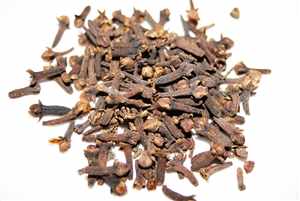Cloves (Syzygium aromaticum)
Main Facts about Cloves

Using Cloves
Cloves are high in vitamins, minerals and fiber. The mild anesthetic property of cloves has been known for a long time. A home-style, temporary toothace anesthetic of some effectiveness is whole bruised cloves held in the mouth. Cloves (or clove oil) could be mixed with zinc oxide to form a temporary tooth cavity filling. Some people use powdered cloves or the oil as an ingredient in mouthwash or sore throat gargles. A tea containing Cloves can act as expectorant and makes coughs less severe and more productive. It also helps with bad breath, halitosis. A component responsible for Clove's anticeptic effect is called eugenol. Thanks to eugenol clove can help clear the skin and get rid of blemishes. Here is a simple recipe of a face mask: crush few cloves and mix them with one tbsp of honey and two tsp of lemon. Apply the mixture on your face, leave it on for about 20 minutes, rinse with cold water. Eugenol also has been found to reduce blood sugar levels in diabetics, but further detailed studies are required to establish its benefits. A less concentrated clove oil can be made at home by soaking whole cloves in olive oil. Clove oil offers a powerful action against gas and bloating. It reduces gas pressure in the stomach, aiding in the proper elimination of food and toxins. It also relieves the discomfort of peptic ulcers and is effective against nausea, hiccups, motion sickness and vomiting. Clove oil can be used to massage sore muscles; sometimes it is also used it for arthritis and rheumatism.Cloves is a remedy for: Cold and flu
Caution!
Pure clove oil may irritate the skin or cause allergic reactions. Do not eat if you have stomach ulcers, ulcerative colitis, and diverticulitis conditions.Cooking with Cloves
The dried buds are used ground or whole. Generally the whole buds are removed from food before serving. Whenever possible, buy whole cloves instead of clove powder since the latter loses its flavor more quickly. For expectorant tea: combine 2 cloves, a stick of cinnamon, and 2 crushed cardamom seeds, add boiling water and let steep for 1 to 2 minutes. You can add black tea to the mix, if you want. For sore throat: add one Clove to a spoon of honey, let it stay in the honey for at least 8 hours, swallow the honey. For congestion: mix three to four ground pieces of Clove, one black pepper and a little bit of tulsi with about 200 ml of water, and boil till it is half its quantity. Once the mixture is ready, strain it and drink with a little honey.How to grow Cloves
Cloves must have a warm, wet steamy climate. They are native to the Moluccas, are widely cultivated in Madagascar, India, Malaysia, Brazil, Sumatra, the Philippines, Jamaica, and other warm regions.| Cinnamon |
Cocoa
|